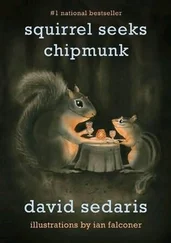"A switch?"
"Yes," he said. "That's it. They'd kick him and beat him with a switch. Then if the youngster was really bad, they'd put him in a sack and take him back to Spain."
"Saint Nicholas wouldkick you?"
"Well, not anymore," Oscar said. "Now he justpretends to kick you."
He considered this to be progressive, but in a way I think it's almost more perverse than the original punishment. "I'm going to hurt you but not really." How many times have we fallen for that line? The fake slap invariably makes contact, adding the elements of shock and betrayal to what had previously been plain old-fashioned fear. What kind of a Santa spends his time pretending to kick people before stuffing them into a canvas sack? Then, of course, you've got the six to eight former slaves who could potentially go off at any moment. This, I think, is the greatest difference between us and the Dutch. While a certain segment of our population might be perfectly happy with the arrangement, if you told the average white American that six to eight nameless black men would be sneaking into his house in the middle of the night, he would barricade the doors and arm himself with whatever he could get his hands on.
"Six to eight, did you say?"
In the years before central heating, Dutch children would leave their shoes by the fireplace, the promise being that unless they planned to beat you, kick you, or stuff you into a sack, Saint Nicholas and the six to eight black men would fill your clogs with presents. Aside from the threats of violence and kidnapping, it's not much different than hanging your stockings from the mantel. Now that so few people actually have a working fireplace, Dutch children are instructed to leave their shoes beside the radiator, furnace, or space heater. Saint Nicholas and the six to eight black men arrive on horses, which jump from the yard onto the roof. At this point I guess they either jump back down and use the door or stay put and vaporize through the pipes and electrical cords. Oscar wasn't too clear about the particulars, but really, who can blame him? We have the same problem with our Santa. He's supposed to use the chimney, but if you don't have one, he still manages to get in. It's best not to think about it too hard.
While eight flying reindeer are a hard pill to swallow, our Christmas story remains relatively dull. Santa lives with his wife in a remote polar village and spends one night a year traveling around the world. If you're bad, he leaves you coal. If you're good and live in America, he'll give you just about anything you want. We tell our children to be good and send them off to bed, where they lie awake, anticipating their great bounty. A Dutch parent has a decidedly hairier story to relate, telling his children, "Listen, you might want to pack a few of your things together before going to bed. The former bishop of Turkey will be coming tonight along with six to eight black men. They might put some candy in your shoes, they might stuff you into a sack and take you to Spain, or they might just pretend to kick you. We don't know for sure, but we want you to be prepared."
This is the reward for living in the Netherlands. As a child you get to hear this story, and as an adult you get to turn around and repeat it. As an added bonus, the government has thrown in legalized drugs and prostitution — so what's not to love about being Dutch?
Oscar finished his story just as we arrived at the station. He was an amiable guy — very good company — but when he offered to wait until my train arrived I begged off, claiming I had some calls to make. Sitting alone in the vast, vibrant terminal, surrounded by thousands of polite, seemingly interesting Dutch people, I couldn't help but feel second-rate. Yes, the Netherlands was a small country, but it had six to eight black men and a really good bedtime story. Being a fairly competitive person, I felt jealous, then bitter. I was edging toward hostile when I remembered the blind hunter tramping off alone into the Michigan forest. He may bag a deer, or he may happily shoot a camper in the stomach. He may find his way back to the car, or he may wander around for a week or two before stumbling through your back door. We don't know for sure, but in pinning that license to his chest, he inspires the sort of narrative that ultimately makes me proud to be an American.
Rooster at the Hitchin' Post
THE NIGHT THE ROOSTER WAS BORN, my father slipped into my bedroom to personally deliver the news. I was eleven years old and barely awake, yet still I recognized this as a supreme masculine moment: the patriarch informing his firstborn son that another player was joining the team. Looking around my room, at the vase of cattails arranged just so beside the potpourri bowl, he should have realized it was not his team I was playing for. Not even a girl would have decoupaged her own electrical sockets, but finding it too painful to consider, my father played through, going so far as to offer a plastic-wrapped cigar, the band readingIT 'S A BOY. He'd gotten one for each of us. Mine was made of chewing gum, and his was the real thing.
"I hope you're not going to smoke that in here," I said. "Normally I wouldn't mind, but I just Scotchgarded the drapes."
For the first six months, my brother, Paul, was just a blob, then a doll my sisters and I could diaper and groom as we saw fit. Dress him appropriately and it was easy to forget the tiny penis lying like a canned mushroom between his legs. Given some imagination and a few well-chosen accessories, he was Paulette, the pouty French girl; Paola, the dark-wiggedbambina, fresh from her native Tuscany; Pauline, the swinging hippie chick. As a helpless infant, he went along with it, but by the age of eighteen months he'd effectively dispelled the theory that a person can be made gay. Despite our best efforts, the cigar band had been right. Our brother was a boy. He inherited my sports equipment, still in its original wrapping, and took to the streets with actual friends, playing whatever was in season. If he won, great, and if he lost, big deal.
"But aren't you going to weep?" we'd ask him. "Not even a little?"
We tried explaining the benefits of a nice long cry — the release it offered, the pity it generated — and he laughed in our faces. The rest of us blubbered like leaky showerheads, but for him water production was limited to sweat and urine. His sheets might be wet, but the pillow would remain forever dry.
Regardless of the situation, for Paul it was always all about the joke. A warm embrace, a heartfelt declaration of concern: in moments of weakness we'd fall for these setups, vowing later to never trust him again. The last time I allowed my brother to hug me, I flew from Raleigh to New York oblivious to the sign he'd slapped to the back of my sports coat, a nametag sticker reading, "Hello, I'm Gay." This following the hilarity of our mother's funeral.
When my sisters and I eventually left home, it seemed like a natural progression — young adults shifting from one environment to the next. While our departures had been relatively painless, Paul's was like releasing a domestic animal into the wild. He knew how to plan a meal but displayed a remarkable lack of patience when it came time for the actual cooking. Frozen dinners were often eaten exactly as sold, the Salisbury steak amounting to a stickless meat Popsicle. I phoned one night just as he was leaning a family pack of frozen chicken wings against the back door. He'd forgotten to defrost them and was now attempting to stomp the solid mass into three 6-inch portions, which he'd stack in a pile and force into his toaster oven.
I heard the singular sound of boot against crystallized meat and listened as my brother panted for breath. "Goddam. . fucking. . chicken. . wings."
I called again the following evening and was told that after all that work, the chicken had been spoiled. It tasted like fish, so he threw it away and called it a night. A few hours later, having decided that spoiled chicken was better than no chicken at all, he got out of bed, stepped outside in his underpants, and proceeded to eat the leftovers directly from the garbage can.
Читать дальше












